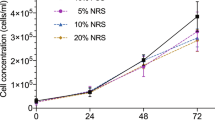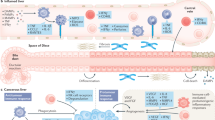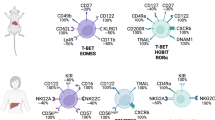Abstract
Carcinoembryonic antigen (CEA) is an oncofetal antigen whose function in the progression of colorectal carcinoma remains unclear although recent studies suggest it participates in homotypic cellular adhesion. We have previously shown that 40 micrograms of CEA injected intravenously into athymic nude mice enhances experimental metastasis in liver and lung by two human colorectal carcinoma cell lines that are injected intrasplenically 30 min later. The metastatic potential of another three moderately to highly metastatic colorectal carcinoma cell lines and of one weakly metastatic line has now been analysed in this model. CEA pretreatment only enhanced colony formation by cell lines that were weakly metastatic in untreated nude mice; it did not affect experimental metastasis by highly metastatic lines. CEA pretreatment enhanced the retention of 125I Idudr-labelled weakly metastatic tumour cells within the liver and lungs 4 h after intrasplenic injection but not the retention of highly metastatic tumour cells or inert latex beads. A significant correlation existed between the formation of experimental metastases and the early retention of tumour cells within the liver after intrasplenic injection. Aggregation did not appear to be important for retention in liver because CEA did not aggregate colorectal carcinoma cells in vitro. Also CEA did not alter natural host effector cell function in a cytolysis assay in vitro. We suggest that CEA facilitates liver colonisation by three of eight human colorectal carcinomas in athymic nude mice by increasing the hepatic retention of tumour cells. The potential mechanisms by which CEA may increase the retention of tumour cells in the liver are discussed.
This is a preview of subscription content, access via your institution
Access options
Subscribe to this journal
Receive 24 print issues and online access
$259.00 per year
only $10.79 per issue
Buy this article
- Purchase on Springer Link
- Instant access to full article PDF
Prices may be subject to local taxes which are calculated during checkout
Similar content being viewed by others
Author information
Authors and Affiliations
Rights and permissions
About this article
Cite this article
Jessup, J., Petrick, A., Toth, C. et al. Carcinoembryonic antigen: enhancement of liver colonisation through retention of human colorectal carcinoma cells. Br J Cancer 67, 464–470 (1993). https://doi.org/10.1038/bjc.1993.88
Issue Date:
DOI: https://doi.org/10.1038/bjc.1993.88
This article is cited by
-
Carcinoembryonic antigen (CEA) and its receptor hnRNP M are mediators of metastasis and the inflammatory response in the liver
Clinical & Experimental Metastasis (2011)
-
Immunogenicity of the carcinoembryonic antigen derived peptide 694 in HLA-A2 healthy donors and colorectal carcinoma patients
Cancer Immunology, Immunotherapy (2007)
-
Effective production of carcinoembryonic antigen by conversion of the membrane-bound into a recombinant secretory protein by site-specific mutagenesis
Pathology & Oncology Research (2005)
-
Carcinoembryonic antigen promotes tumor cell survival in liver through an IL-10-dependent pathway
Clinical & Experimental Metastasis (2005)
-
Coexpression of carcinoembryonic antigen and e-cadherin in colorectal adenocarcinoma with liver metastasis
Journal of Gastrointestinal Surgery (2003)



